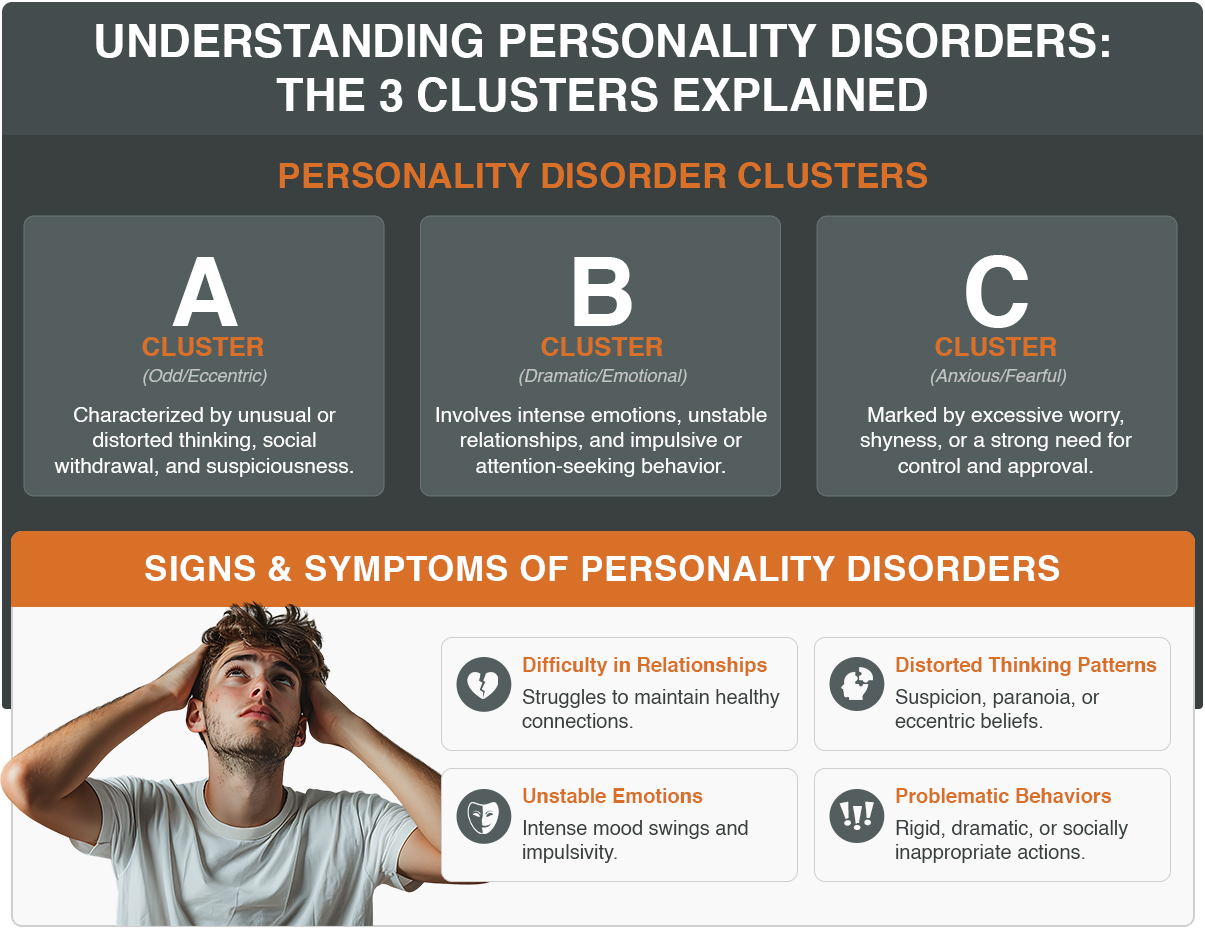Personality disorders and substance use are significant issues in mental health that often intersect, making treatment solutions more complex. Personality disorders involve persistent patterns of behavior and thinking, while substance use disorders involve problematic substance consumption. When these two conditions occur together, known as dual diagnosis or co-occurring disorders, it can present unique challenges. Understanding how these conditions interact is key to providing effective treatment and improving outcomes in mental health care.
First Steps Recovery can provide support and guidance to navigate these complexities and facilitate the journey toward healing and recovery. Our comprehensive approach addresses both the underlying issues of personality disorders and substance use, empowering individuals to achieve lasting wellness. Through personalized treatment plans, therapeutic interventions, and compassionate care, we strive to help individuals regain control of their lives and build a foundation for a brighter future.

Personality disorders are a type of mental health condition that affects the way people think, feel, and behave. These conditions can cause significant distress and problems in relationships, work, and other areas of life. Unlike temporary mood changes or quirks in behavior, personality disorders involve persistent patterns of thoughts, emotions, and behaviors that deviate from what society considers normal. These patterns tend to be rigid and inflexible, making it challenging for individuals to adapt to different situations or relate to others effectively.
There are several types of personality disorders, each with its own set of symptoms and characteristics, but they all share the common trait of causing difficulties in functioning and relating to others. Treatment for personality disorders typically involves therapy, medication, and support to help individuals manage their symptoms and improve their quality of life.

Signs and symptoms of personality disorders can vary depending on the specific type. It can manifest differently in each individual, and not everyone with a personality disorder will exhibit all of them, but some signs include:
Individuals with personality disorders often struggle to establish and sustain healthy relationships. They may have intense and unstable relationships, experience difficulties in understanding others’ perspectives, or have trouble trusting others.
Individuals with personality disorders may have a distorted or unstable self-image. They may struggle with feelings of worthlessness, inadequacy, or emptiness. This can lead to frequent changes in goals, values, or career choices.
Emotional dysregulation is a key feature of many personality disorders. This can manifest as intense and unstable emotions, such as anger, anxiety, sadness, or irritability. Individuals may have difficulty controlling their emotions, leading to impulsive behaviors or mood swings.
Emotional dysregulation is a key feature of many personality disorders. This can manifest as intense and unstable emotions, such as anger, anxiety, sadness, or irritability. Individuals may have difficulty controlling their emotions, leading to impulsive behaviors or mood swings.
People with personality disorders may have limited coping mechanisms and struggle to deal with stress or adversity. They may engage in maladaptive coping strategies, such as avoidance, self-harm, or substance abuse, to manage their distress.
Some personality disorders, such as paranoid personality disorder, are characterized by pervasive distrust and suspicion of others’ motives. Individuals may perceive benign actions as threatening and may be prone to holding grudges or seeking revenge.
While some individuals with personality disorders may exhibit intense and unstable relationships, others may withdraw from social interactions altogether. They may prefer solitude to avoid potential conflicts or rejection.
Certain personality disorders, such as schizotypal personality disorder, may involve eccentric beliefs or perceptual distortions. Individuals may experience magical thinking, odd beliefs, or unusual perceptual experiences that deviate from cultural norms.
Certain personality disorders, such as schizotypal personality disorder, may involve eccentric beliefs or perceptual distortions. Individuals may experience magical thinking, odd beliefs, or unusual perceptual experiences that deviate from cultural norms.

Personality disorders are classified into several types, grouped according to the DSM-5 (Diagnostic and Statistical Manual of Mental Disorders, Fifth Edition) classification system:

Personality disorders and substance abuse often intertwine, forming a complex relationship that exacerbates each other’s symptoms. Individuals with personality disorders may turn to substance abuse as a means of self-medication to cope with their symptoms. In contrast, the impulsivity and sensation-seeking behavior characteristic of these disorders can lead to risky substance use.
Additionally, substance abuse may serve as a form of escapism from emotional distress, further entrenching the cycle of dysfunction. Social factors such as isolation and peer influence can also contribute to the co-occurrence of these conditions. Moreover, shared risk factors and the interference of substance abuse with treatment for personality disorders complicate the therapeutic process.
Research has looked into how addiction and personality disorders go hand in hand, and it’s shown that somewhere between 65-80 percent of those dealing with addiction have already been diagnosed with a personality disorder.
To effectively intervene, it’s crucial to address both the underlying personality disorder and substance abuse at the same time. Understanding the intricate relationship between these conditions is essential for enhancing treatment results and aiding individuals in escaping the cycle of dysfunction.
Addictions come in various forms and intensities, as each individual possesses a unique chemical composition, personal background, and genetic foundation. The effects of different drugs on specific symptoms vary depending on the type of personality disorder one experiences. Some individuals may combine multiple substances or mix them with prescribed medications, while others may have a preferred drug or alcohol of choice.
Common addictions that often coincide with personality disorders include
Regardless of the specific addiction, its impact on personality disorders is consistently negative. Being afflicted with a personality disorder and addicted to substances can exacerbate symptoms, deteriorate mental health, and complicate treatment.
Treatment for individuals with both personality disorders and substance abuse issues often involves a dual-diagnosis approach. This means addressing both conditions simultaneously to provide comprehensive care and improve outcomes.
Dual diagnosis treatment typically integrates therapeutic modalities aimed at managing the symptoms of the personality disorder while also addressing the patterns of substance abuse. This may include:
All of these services are available at our residential treatment center in California, providing a supportive environment for individuals to focus fully on recovery.
Additionally, medication management may be utilized to address symptoms of the personality disorder or to support recovery from substance abuse. By simultaneously addressing both aspects of the dual diagnosis, individuals can work towards long-term recovery and improved overall well-being.

At First Steps Recovery, we excel at addressing the complex interplay between personality disorders and substance abuse through our specialized dual diagnosis program. Our approach is tailored to meet the unique needs of each individual, ensuring comprehensive care that targets both conditions simultaneously. By integrating therapeutic interventions, personalized support, and evidence-based treatments, we empower individuals to overcome dysfunction and attain sustainable recovery. If you’re facing the challenges of co-occurring personality disorders and substance abuse, let us guide you toward healing and a brighter future. Take the first step towards recovery and contact us today.

From our certified therapists and nurses to our emotional support animal "Cooper", our entire team is dedicated to the health and success of our clients throughout our program and beyond.
Have questions about how our treatment programs works? Let's talk.
ADHD, or ADD, is a common neurodevelopmental disorder with attention and impulse control difficulties that can lead to substance abuse. Treatment with therapy and medication is crucial.
Anxiety disorder is a mental health condition characterized by excessive and persistent feelings of fear, worry, and apprehension that can significantly impact a person's daily life.
Bipolar disorder is a mental health condition characterized by extreme mood swings, including episodes of mania (elevated mood and energy) and depression (low mood and loss of interest).
Depression is a mental health disorder characterized by persistent sadness, loss of interest, and other emotional and physical symptoms
An eating disorder is a mental health condition characterized by abnormal eating habits. Getting help is important to address physical and psychological health risks, improve quality of life, and promote recovery.
Personality disorder is a mental health condition characterized by unhealthy patterns of thinking, behaving, and relating to others. Getting help is crucial to improve relationships, coping skills, and overall well-being.
PTSD (Post-Traumatic Stress Disorder)/Trauma disorder is a mental healtah condition resulting from experiencing or witnessing traumatic events. Getting help is important to process trauma, reduce symptoms, and improve overall quality of life.
Schizophrenia is a mental health disorder characterized by hallucinations, delusions, and disorganized thinking. Getting help is vital to manage symptoms, improve functioning, and enhance overall quality of life.
Have questions about our substance abuse treatment programs? Let’s talk.
Dayatra L.
Melissa B.
Bruce G.
Have questions about how our alumni program works? Let's talk.










Have questions about First Steps Recovery? We're here to help.
© Copyright 2023 • First Steps Recovery • All Rights Reserved